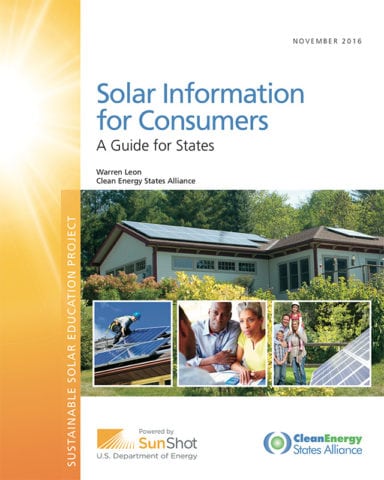The States’ Role in Providing Solar Information to Consumers
 State governments have an increasingly important obligation and opportunity to present the public with sound, unbiased, user-friendly information on solar energy systems and financing options. With hundreds of thousands of solar photovoltaic (PV) systems being installed at homes, businesses, and institutions, consumers need help to ensure that they make decisions that give them long-lasting satisfaction rather than regrets.
State governments have an increasingly important obligation and opportunity to present the public with sound, unbiased, user-friendly information on solar energy systems and financing options. With hundreds of thousands of solar photovoltaic (PV) systems being installed at homes, businesses, and institutions, consumers need help to ensure that they make decisions that give them long-lasting satisfaction rather than regrets.
The need for consumer information from states is greater for solar systems than for more traditional large purchases. The solar industry is relatively new and does not have well-established brands, easily accessible product review websites, or industry-specific consumer protection laws, such as automobile “lemon laws” and standardized disclosure forms for car leases.
Few people who have invested in solar PV have been unhappy with their purchases. But as the industry grows, it is important that consumers know that the equipment they purchase will perform as advertised, and that they don’t feel misled by unreliable vendors. Otherwise, long-term public support for solar could erode.
State government agencies are well placed to provide information that can help consumers choose wisely. A state agency can be impartial and does not have a vested interest in having a consumer make one type of solar-related choice over another. Accurate information from the state can give consumers much greater confidence in their decision to go solar.
There are a range of specific reasons why states should consider providing more information on solar:
- Many states have policies and incentive programs to encourage solar development. States can bolster those policies and programs by offering information that facilitates good decision making by solar consumers.
- If states do not provide information proactively, they may expend more resources responding to individual inquiries about solar technology providers and to questions about solar financing options, as well as redressing problems concerning solar purchases.
- The advent of new solar financing options, such as leases and power purchase agreements (PPAs) in many states, helped fuel the rapid growth in the number of solar installations, but it also made consumers’ decisions more complex. Consumers can have difficulty understanding and evaluating all the provisions in the contracts they are offered. They may not know about contract provisions that would be beneficial to them or how to make sure they are included. A state energy agency or consumer protection agency can help consumers understand and evaluate the different financing options.
- Although most solar installation companies seek to deal with prospective customers professionally and appropriately, there have been instances of overly aggressive or misleading marketing and sales tactics.
- Solar PV equipment and installation quality can vary, especially because of the technical complexities of the systems. Better information can help customers understand the choices in terms of equipment quality and function, encourage them to obtain multiple quotes when shopping for a system, enable them to ask better questions of installers, and better prepare them for maintenance and use of their system after installation.
- It can be difficult to quantify with precision the costs and benefits of a solar installation. It is therefore important for consumers to understand the economic assumptions made by installers who provide a cost estimate for a system. Providing guidance about questions to ask and the factors to consider, such as possible future changes to electricity rates and net metering policies, can help customers better understand the risks and financial consequences of their decisions.
- States have an interest in maintaining a robust, competitive, and fair marketplace for all businesses, including solar businesses.
To help states decide what types of solar information to disseminate, the Clean Energy States Alliance (CESA) has just released Solar Information for Consumers: A Guide for States. This free guide describes the types of information that can be useful, highlights existing educational efforts by states, and provide models and useful resource information. Although the focus of the guide is on educational efforts that could be undertaken by states, its messages and approaches can apply to municipalities, counties, and municipal utilities.
On November 17 from 1-2 PM ET, there will be a webinar to provide an overview of the guide and answer questions (register here). Both the guide and the webinar are products of CESA’s Sustainable Solar Education Project, which is supported through an award from the U.S. Department of Energy SunShot Initiative. More information about the SunShot Initiative can be found at http://energy.gov/eere/sunshot/sunshot-initiative.
***
This blog post was also published in Renewable Energy World.
Published On
November 10, 2016

